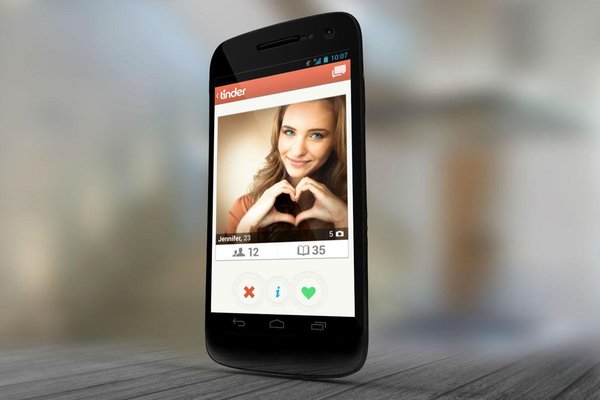Table of Contents
Tinder is a fast-growing, new location-based discovery app that is used for dating.
Have you heard of the Tinder App for dating yet? Unlike other online dating platforms like eHarmony, Match.com or OkCupid, there is a particularly simpler aspect to Tinder, without any greater claims of compatibility or profile algorithms.
Tinder users are simply shown other Tinder users in the vicinity. It’s as simple as swiping your fingers over the touchscreen to the left (“no thanks”) or the right (“yes, please”). This process sorts through the photographs of potential mates in your search for love.
When two people swipe yes for each other, they are a “match,” and then a user can take it to the next step. Each profile is legitimised with a link to a user’s Facebook for further insurance. Facebook profiles give the Tinder app a general idea of a user’s social graph, linking potential candidates most likely to be compatible. The app incorporates information such as common interests and the number of mutual friends. However, none of these smaller details are revealed, and the swiping process is anonymous.
Does Tinder App actually help dating?
There’s maybe an element of truth to all of this swiping through profiles. Whether we notice it ourselves or not, we walk around and judge strangers, saying “yes” “no” “yes” in our minds. Interestingly, research indicates that most mates on Tinder are considered equally good-looking. Technology has certainly made romance a lot easier. Now all you need is a smartphone to open up an amorous world of endless possibilities.
Still, does an encounter like this foster a long-term relationship, let alone a happy or healthy one? Perhaps the initial physical attraction to your date is very important, but it depends on whether a user is even looking for a romantic companion.
While OkCupid had the option of checking off “short -term” or “long-term”, Tinder has been dubbed the “hook-up” app. Most matches tend to end up physically intimate very quickly. People don’t even feel disappointed when they’ve been rejected because they can just keep swiping. A match will happen eventually.
Tinder App encourages superficial relating
Casual dating is blurred with superficiality because you’re swiping through Tinder users based mostly on physical appearances. You have nothing revealed to you but a single photograph, their age, and how far away the user is when you’re swiping through different people of the opposite sex. It’s almost difficult to realise that users are people with complex personalities too, unless you go to meet them face-to-face. The game-like atmosphere is over once you have to witness the flaws. Tinder feeds off of your wildest imaginations and hopes for a romantic relationship.
What does an app like Tinder do to one’s self-esteem? When a match is made, let the flirtatious messages commence! You can respond to a Tinder match with no strings attached, and let’s face it. It’s nice to have someone, whom you consider attractive, feel the same way about you.
There’s also a certain amount of freedom that comes with romantic ventures when the connection is a chance encounter. You have nothing to fear- at the very least; you look good to them in that photo you uploaded of yourself. Tinder can be addictive for this reason. Users may become preoccupied with their own photographs and find themselves in a narcissistic vanity fair. This is nothing unique to the Tinder app. Smartphones, in general, are socially criticized for the rigorous self-indulgence that comes with it.
Is it possible that your soulmate is one swipe away on Tinder?
It’s mostly a “hot or not” website, wading through users, initiating a chat or scheduling a meeting with your newfound phantom love interest.
We’re far from the days of meeting a boyfriend or girlfriend through a friend, even a friend of a friend. The Tinder app is free on the app store, and that can add to the appeal when you’re lonely. On the bright side, if you’re shy or timid, social and physical barriers are lessened. There are users out there however who are looking for a shortcut to sex, but you can block such users if you’re receiving unwanted attention.
Maybe it’s too easy, and the connectivity of the unreal world is making us less connected with our next door neighbours. Even still, on apps like Tinder, you might have swiped your next door neighbor to the right without knowing.
It’s difficult to assert that the option of Tinder is good or bad. When communication between two people getting to know each other is one-dimensional or limited to text, it can leave room for misinterpretation and second-guessing.
If Tinder users are aware of their habits and tendencies in real life when it comes to relationships, perhaps they can exercise caution and find new love.
Do you need relationship help?
If you need help with your relationship, contact Clinton Power + Associates on (02) 8968 9323 to discuss your situation and find out how we can help.
Since 2003, Clinton Power has helped thousands of couples and individuals as a counsellor and psychotherapist in private practice in Sydney and online in Australia. Clinton regularly comments in the media on issues of relationships and has appeared on Channel 7, The Sydney Morning Herald, and ABC Radio. Clinton’s eBook, 31 Days to Build a Better Relationship is available through his website or Amazon. Click here to take Clinton’s relationship checkup quiz to find out how well you know your partner.

